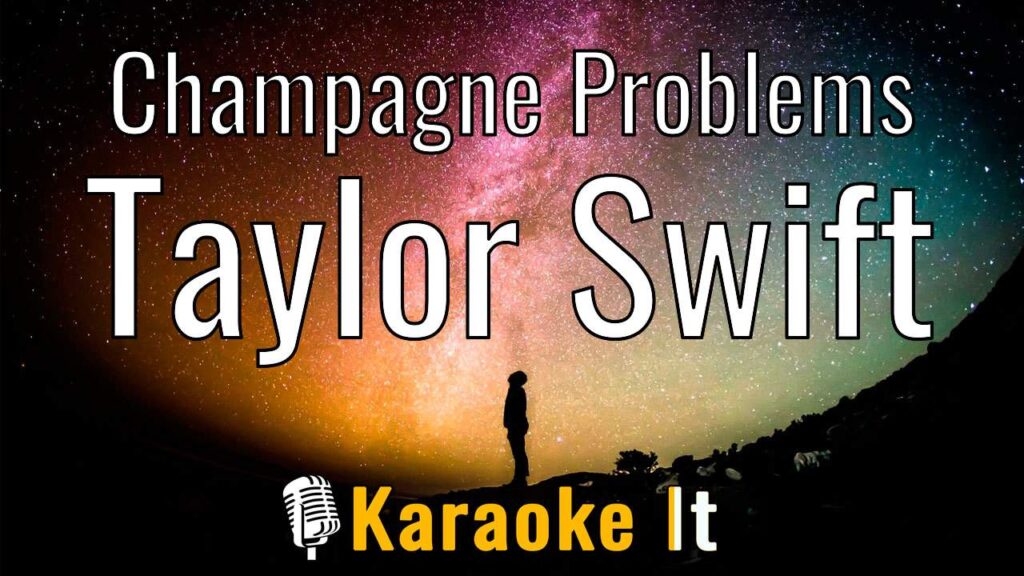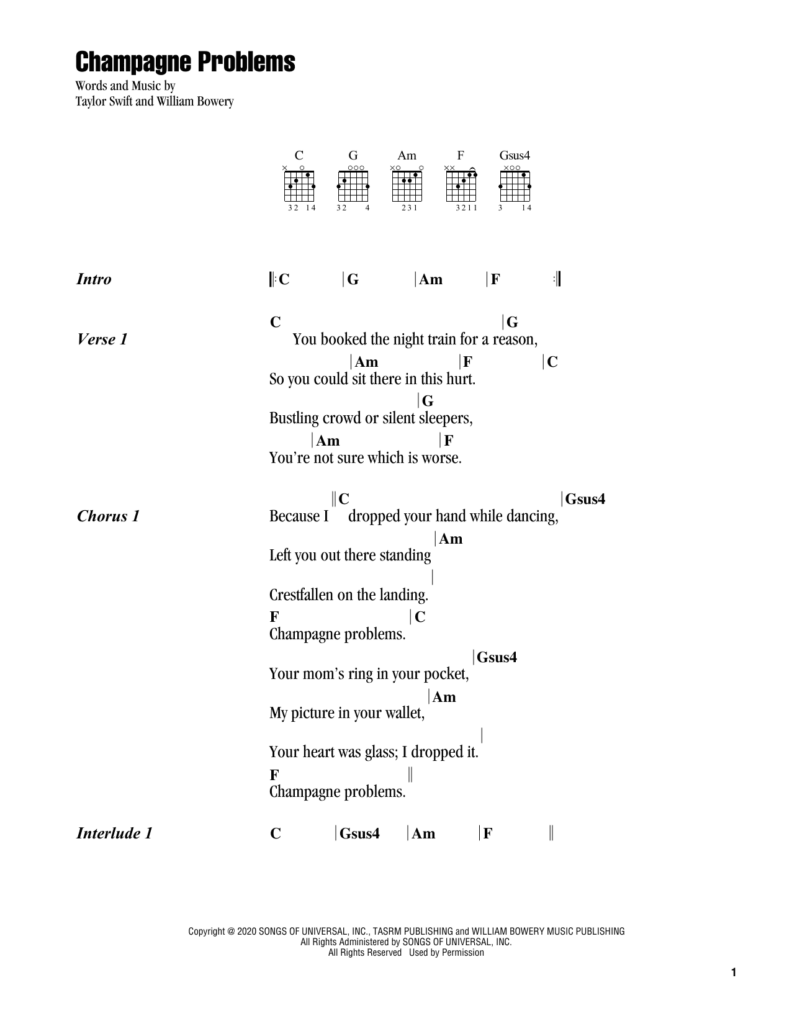
1. Setting the Stage: Evermore & Song Origins
“Champagne Problems” is the second track on the Evermore album, Taylor’s ninth studio release — often considered the winter sister album to Folklore. It’s a mostly acoustic, melancholic record, steeped in storytelling and emotional subtlety. The collaboration with Joe Alwyn adds a layer of intimacy, as if we’re being let into a private story told through Taylor’s distinctive poetic lenses.
In the production style, Aaron Dessner’s influence ensures the song breathes space — a sparse piano takes prominence, letting the words land softly and powerfully. This quietness feels particularly fitting given the song’s subject: a quiet heartbreak, a relationship ending not with a bang but a whispered pause.
2. The Story Told by the Lyrics
At its core, “Champagne Problems” is about a college couple whose relationship ends with a rejected marriage proposal. But Taylor doesn’t hand us a simple narrative or neat explanations. Instead, the story unfolds with hesitation, unsaid feelings, and a swirl of regret and confusion.
Verse 1 Breakdown
- “You booked the night train for a reason / So you could sit there in this hurt”: The song opens with the boyfriend escaping, sitting alone on a train, trying to process the rejection. There’s ambiguity whether the noise of “bustling crowds” or “silent sleepers” feels worse — an unanswerable question that captures the loneliness of heartbreak.
- It feels like the sort of thought you wrestle with late at night — not knowing whether being alone or surrounded is more painful.
Chorus Breakdown
- “Because I dropped your hand while dancing / Left you out there standing”: Small but piercing gestures, “dropping a hand while dancing” symbolizes abandonment and rejection in a moment meant for connection.
- The imagery of a “glass heart” being dropped expresses vulnerability shattered; it’s painful and tender.
- The phrase “champagne problems” itself emerges as a bitter irony — a term that trivializes deeply felt emotional pain.
Verse 2 Breakdown
- Family and friends come into focus. The boyfriend has told family; the sister splashes out on champagne meant for a celebration that never occurs.
- These small details ground the story in realistic social contexts — a heartbreak that affects more than just two individuals.
Bridge Breakdown
- Arguably the centerpiece: “Your Midas touch on the Chevy door / November flush and your flannel cure” conjures images of intimacy mixed with melancholy.
- Swift’s admission: “I never was ready, so I watch you go” captures an emotional truth many relate to — not being fully ready for a moment that demands a decision.
- The bitter judgment delivered by others is stark in the line, “What a shame she’s fucked in the head,” showcasing the stigma and misunderstanding often surrounding mental health.
- The bridge is full of dualities — fondness and regret, cruelty and sympathy, personal pain and external judgment.
Outro Breakdown
- “You won’t remember all my champagne problems” — a quiet resignation. Though these troubles may fade from others’ memories, they still shape the narrator’s heart and story.
3. Literary Devices and Symbolism in “Champagne Problems”
Taylor Swift’s strength lies not just in storytelling, but in embedding symbolism that makes the song resonate on many emotional levels.
- “Champagne Problems”: A phrase that sarcastically suggests trivial worries but here highlights the emotional gravity of internal struggles others might minimize.
- Glass heart: The fragility of love and trust, easily shattered.
- Mom’s ring: Symbolizes familial expectations and the bittersweet weight of marriage proposals.
- Night train: Symbolic of escape and emotional distance.
- Dom Pérignon bottle: A luxury item brought but unopened, underscoring a celebration that never happened.
- Color & Season: November’s “flush” and flannel suggest melancholy warmth and coldness, grounding the song in time and mood.
4. The Narrator’s Perspective: Regret and Ambiguity
Unlike many breakup songs, “Champagne Problems” retains the narrator’s voice in a place of uncertainty and self-doubt rather than clarity or blame.
She shoulders responsibility for the rejection but can’t fully articulate why she couldn’t say “yes.” This lack of explanation rings true for many who have struggled through difficult decisions; sometimes feelings refuse tidy conclusions.
The narrator’s admission that she “never was ready” conveys vulnerability, as does her awareness of how others judge her, but she neither fully rejects nor embraces these judgments, leaving us with ambivalence.
From personal experience, I find these moments resonate deeply — that feeling of indecision and the pain in wanting to do right, but not having the capacity at the moment.
5. The Broader Social Context: Family, Friends, and Judgment
Swift situates the heartbreak within a wider social frame, revealing how personal decisions ripple outwards.
- The sister buying champagne for a celebration that won’t come shows how others invest emotional energy in the couple’s future.
- The mention of “hometown skeptics” highlights judgment from community members and societal pressure on relationships and marriage.
- The harsh gossip delivered in the bridge line illustrates how mental health stigma can exacerbate grief and isolation.
In this way, the song becomes more than a love story; it’s about social expectations and the consequences of deviating from them.
6. Mental Health Underlying Themes
While never explicit, mental health considerations loom large, especially in the bridge’s mention of the dorm as a “madhouse” and the stigmatizing comments she faces.
Many listeners and critics interpret the narrator’s refusal as influenced by struggles with mental health or emotional readiness, adding complexity to the story.
This indirect yet powerful approach lets listeners project their own experiences and opens the door to empathy and conversation around often-taboo topics.
7. What Exactly Are “Champagne Problems”?
The idiom “champagne problems” generally refers to troubles that are trivial or indulgent in the grand scheme. Taylor flips this idea, spotlighting how problems that might look minor from outside can cut deeply inside.
It’s a commentary on perspective — comparing the narrator’s pain with others’ life hardships, and how emotional struggles don’t always get the compassion they deserve.
8. Behind the Scenes: Collaboration and Production
Joe Alwyn’s co-writing credit (under the alias William Bowery) and Aaron Dessner’s production shape the song’s intimate feel.
- The piano-driven arrangement is sparse yet evocative, letting Taylor’s vocals carry emotional weight.
- Dessner’s influence is heard in the spaciousness of the sound — where silence and space are as important as melody.
- This production choice mirrors the themes of isolation and uncertainty found in the lyrics.
9. Fan Interpretations & Theories
Fans have latched onto “Champagne Problems” with myriad personal readings, expanding the song’s meaning beyond what Taylor explicitly states.
- Some focus on the mental health subtext, seeing the narrator as grappling with inner demons.
- Others view it as a cautionary tale about relationship timing and communication.
- Many connect with the idea of societal judgment faced by the narrator.
- There’s debate about whether she is selfish or self-aware — leaving it open-ended is part of the song’s brilliance.
10. Reception and Cultural Impact
“Champagne Problems” has been embraced for its literary storytelling, emotional depth, and relatable themes.
- The song scored high praise from critics for its lyrical nuance and vulnerable narrative.
- On social media, fans passionately share covers, memes, and personal stories inspired by the song.
- It frequently features in setlists during Taylor’s Eras world tours and has become a fan favorite to sing aloud.
- The song also pops up in discussions about mental health and relationship complexities within cultural essays.
11. Similar Taylor Swift Songs to Explore
If you find yourself moved by “Champagne Problems,” you might enjoy other songs exploring heartbreak and introspection:
- Tolerate It: Lovesick devotion unnoticed.
- The 1: Reflective nostalgia for what might have been.
- Betty: Young love, mistakes, and apologies.
- Invisible String: Fate and tender connections woven through life.
For a more in-depth look at Taylor’s songwriting craft, this ranking of her top lyrics is invaluable.
12. Deep Dive: Line-by-Line Notable Lyrics
Some lines warrant pause and reflection:
- “You booked the night train for a reason…” — The choice to escape alone with pain.
- “Dropped your hand while dancing…” — Small moments signaling great emotional rifts.
- “Dom Pérignon, you brought it / No crowd of friends applauded…” — Luxury and joy without celebration.
- “She would’ve made such a lovely bride…” — Social condemnation and misunderstanding pour in.
- “You won’t remember all my champagne problems…” — The quiet weight of forgotten sorrows.
13. Why “Champagne Problems” Resonates So Deeply
It’s in Taylor’s ability to merge the specific and universal. Not everyone turns down a proposal, but everyone knows the sting of disappointing someone or being disappointed; everyone grapples with ambiguous feelings and judgment.
The song offers permission to those who feel uncertain, unsettled, or incomplete, capturing the messy emotional spaces most shy away from.
14. Taking The Conversation Forward
If this article moved you, or stirred new questions, I encourage you to explore:
- A deep dive into the true meaning behind Champagne Problems
- The full Evermore album context
- Taylor’s greatest lyrical moments compilation
15. Conclusion: Ambiguity as Strength
“Champagne Problems” isn’t about closure. It’s a conversation — an unfinished sentence, a question, an open wound made art. It invites us to sit with uncertainty, the conflicting emotions, and the bittersweet tension that defines heartbreak. I think that’s why it lingers — it doesn’t give answers, but offers empathy to those still trying to find them.
So listen again, argue with friends, question yourself. Because sometimes the deepest truths come wrapped in the unresolved.





